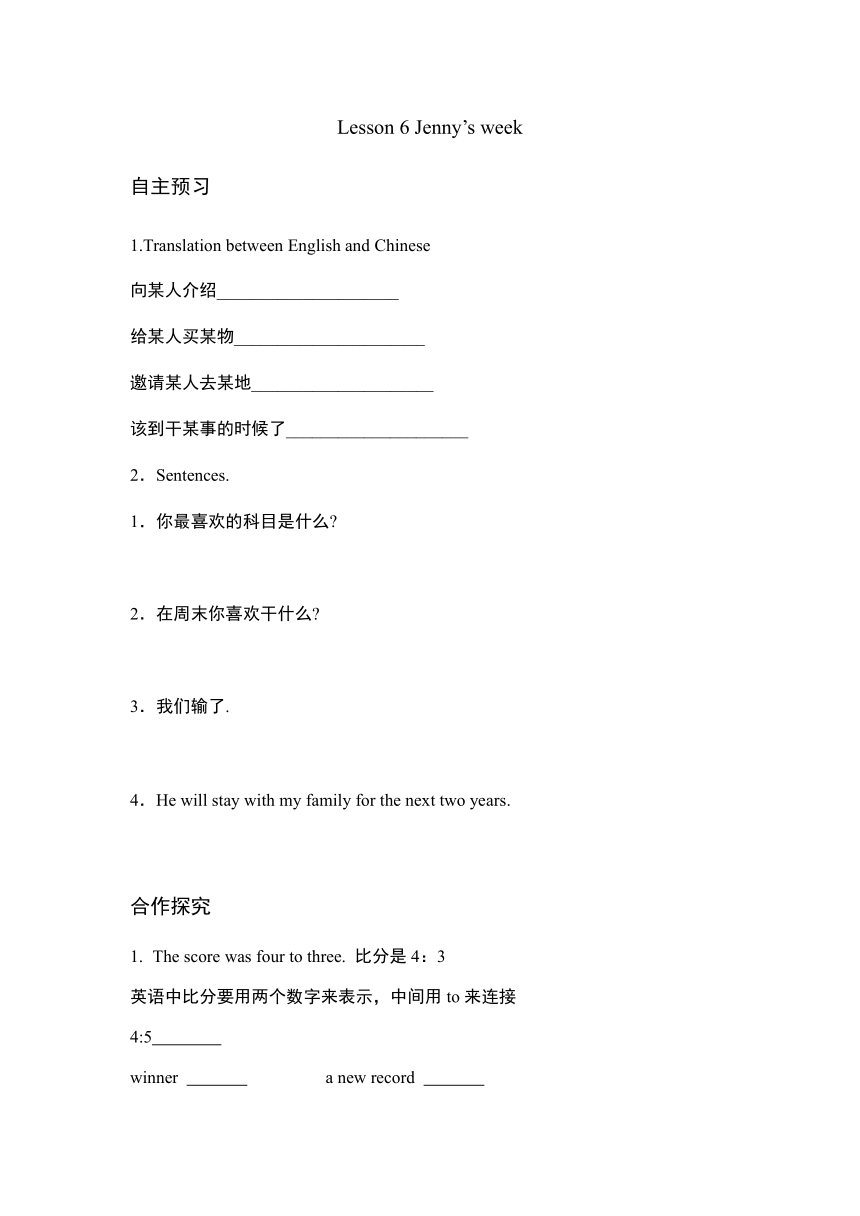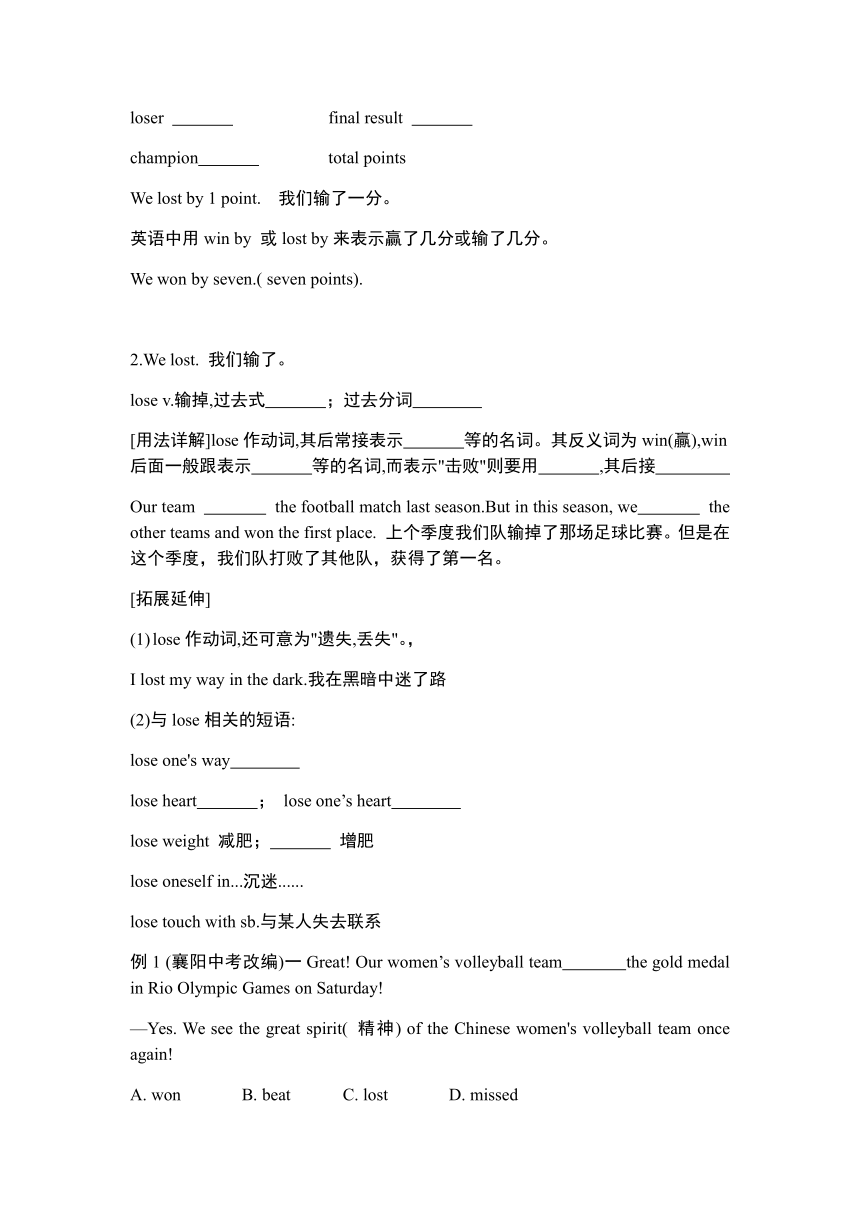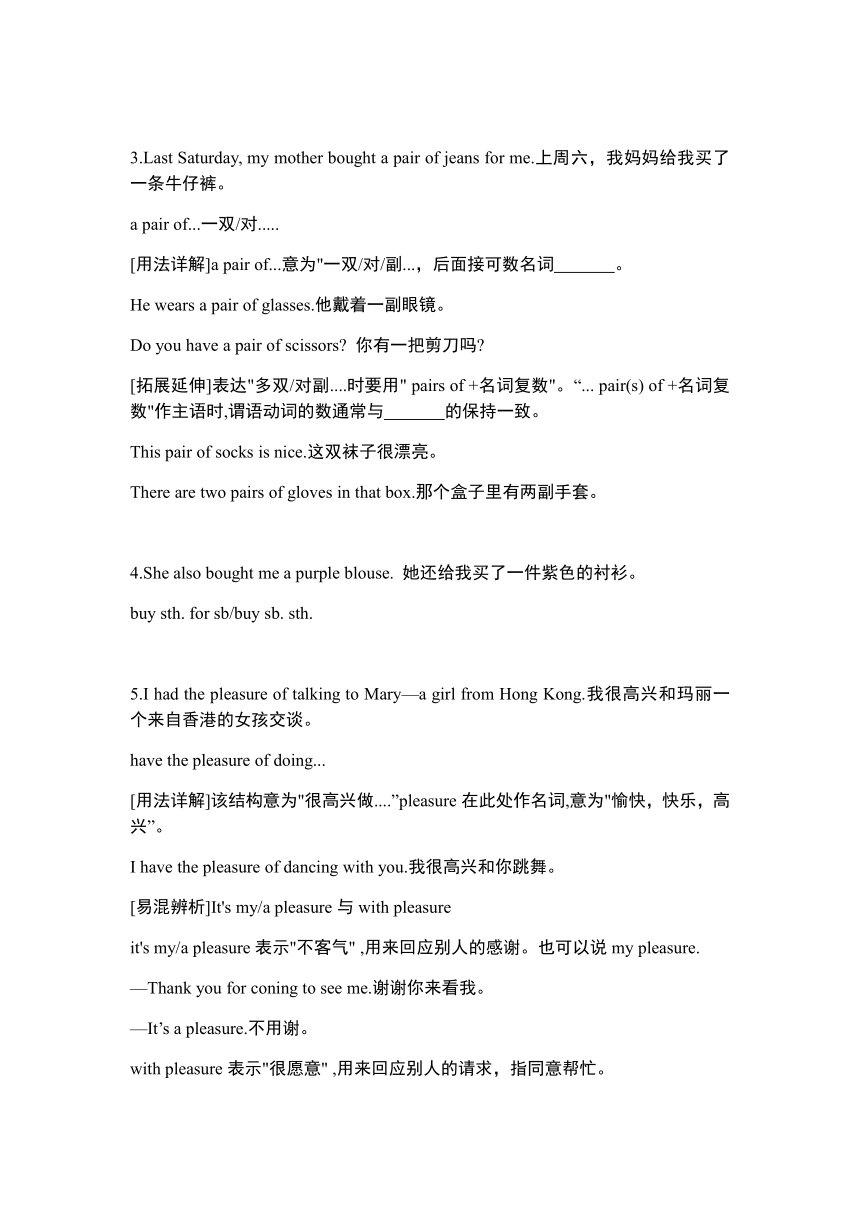冀教版英语八年级上册Unit 1 Me and My Class Lesson 6 Jenny's Week知识点详解自主探究学案(无答案)
文档属性
| 名称 | 冀教版英语八年级上册Unit 1 Me and My Class Lesson 6 Jenny's Week知识点详解自主探究学案(无答案) |  | |
| 格式 | docx | ||
| 文件大小 | 19.2KB | ||
| 资源类型 | 教案 | ||
| 版本资源 | 冀教版 | ||
| 科目 | 英语 | ||
| 更新时间 | 2021-01-02 11:03:10 | ||
图片预览



文档简介
Lesson 6 Jenny’s week
自主预习
1.Translation between English and Chinese
向某人介绍_____________________
给某人买某物______________________
邀请某人去某地_____________________
该到干某事的时候了_____________________
2.Sentences.
1.你最喜欢的科目是什么?
2.在周末你喜欢干什么?
3.我们输了.
He will stay with my family for the next two years.
合作探究
The score was four to three. 比分是4:3
英语中比分要用两个数字来表示,中间用to来连接
4:5
winner a new record
loser final result
champion total points
We lost by 1 point. 我们输了一分。
英语中用win by 或lost by来表示赢了几分或输了几分。
We won by seven.( seven points).
2.We lost. 我们输了。
lose v.输掉,过去式 ;过去分词
[用法详解]lose作动词,其后常接表示 等的名词。其反义词为win(贏),win后面一般跟表示 等的名词,而表示"击败"则要用 ,其后接
Our team the football match last season.But in this season, we the other teams and won the first place. 上个季度我们队输掉了那场足球比赛。但是在这个季度,我们队打败了其他队,获得了第一名。
[拓展延伸]
lose作动词,还可意为"遗失,丢失"。,
I lost my way in the dark.我在黑暗中迷了路
(2)与lose相关的短语:
lose one's way
lose heart ; lose one’s heart
lose weight 减肥; 增肥
lose oneself in...沉迷......
lose touch with sb.与某人失去联系
例1 (襄阳中考改编)一Great! Our women’s volleyball team the gold medal in Rio Olympic Games on Saturday!
—Yes. We see the great spirit( 精神) of the Chinese women's volleyball team once again!
A. won B. beat C. lost D. missed
3.Last Saturday, my mother bought a pair of jeans for me.上周六,我妈妈给我买了一条牛仔裤。
a pair of...一双/对.....
[用法详解]a pair of...意为"一双/对/副...,后面接可数名词 。
He wears a pair of glasses.他戴着一副眼镜。
Do you have a pair of scissors? 你有一把剪刀吗?
[拓展延伸]表达"多双/对副....时要用" pairs of +名词复数"。“... pair(s) of +名词复数"作主语时,谓语动词的数通常与 的保持一致。
This pair of socks is nice.这双袜子很漂亮。
There are two pairs of gloves in that box.那个盒子里有两副手套。
4.She also bought me a purple blouse. 她还给我买了一件紫色的衬衫。
buy sth. for sb/buy sb. sth.
5.I had the pleasure of talking to Mary—a girl from Hong Kong.我很高兴和玛丽一个来自香港的女孩交谈。
have the pleasure of doing...
[用法详解]该结构意为"很高兴做....”pleasure在此处作名词,意为"愉快,快乐,高兴”。
I have the pleasure of dancing with you.我很高兴和你跳舞。
[易混辨析]It's my/a pleasure与with pleasure
it's my/a pleasure表示"不客气" ,用来回应别人的感谢。也可以说my pleasure.
—Thank you for coning to see me.谢谢你来看我。
—It’s a pleasure.不用谢。
with pleasure表示"很愿意" ,用来回应别人的请求,指同意帮忙。
—Could you post the letter for me?你能帮我邮寄这封信吗?
—With pleasure. 乐意效劳。
典例2(宜宾中考改编)—have difficulty working out the problem by myself. Could you help me?
—
A. It's my pleasure
B. With pleasure
C. Not at all
【拓展延伸】
please(v.使高兴;使满意);其形容词加 形容词后缀,构成 (adj,高兴的,满意的) ,用来修饰人;加 形容词后缀,构成 (adj.使人高兴的;令人满意的),常用来修饰物。
6. She invited me to go to the movies with her next Sunday.她邀请我下周日和她一起看电影。
invite v.邀请
[用法详解] invite作动词,短语 .意为"邀请某人做某事" ,
" "意为"邀请某人去某地"。
Jimmy invited us to go to his birthday party. 吉米邀请我们去参加他的生日聚会。
They invited us to Guilin.他们邀请我们去桂林。
[拓展延伸]invite的名词形式为 , 意为"邀请;请束,请帖"。
We will send out hundreds of invitations this week. 我们本周将要寄出数百份请束。
He accepted our invitation to lunch.他接受了我们共进午餐的邀请。
例3 (2018.天津中考) Harry invited me with him when his parents were out of town.
A. Stay B. stayed C. staying D. to stay .
7.Mary's parents work in a local restaurant.玛丽的父母在当地的一家餐馆工作。
Local adj.本地的,当地的/n.当地人
[用法详解]
(1)local在此处作形容词,意为"本地的,当地的”。
The local guide spoke as clearly as she could to make the visitors understand her.
(选自2018宿迁中考)
(2)local还可作名词,意为"当地人" ,通常用复数形式 。
Ask the locals which is the shortest way to get there.请教一下当地人哪条路赶往那里最近。
语境串记:
Let's ask the for more information about the restaurants.让我们问问当地人,以便多了解一些当地饭馆的情况。
8.On Wednesday, my cousin Brian is arriving from the U. K.我的表弟布莱恩将于星期三从英国过来。
[句式剖析]此处is arriving 意为"将要到达" ,为现在进行时表示将来的用法。可以用现在进行时表示将来的动词还有 等。
I'm leaving for Shanghai tomorrow.我明天就要动身去上海了。
arrive v..到达,抵达
[易混辨析]arrive,get与reach三者均可表示"到达,抵达" ,区别如下:
arrive 不及物动词,arrive +大地点;arrive +小地点
arrive +地点类副词(如home,there, ,here等)
get不及物动词,get +地点,get+地点类副词(如home,there ,here等)
reach及物动词,reach +地点
The student arrived in England last week.那名学生上周到达了英国。
Gill will arrive at the station on time. 吉尔将准时到达车站。
. 这位医生昨晚到家很晚。
He got to the restaurant before others,他比其他人先到达饭店。
We can't get there at 9 :00 in the morning. 我们上午九点到不了那儿。
. 他一个小时后到达了上海。
自主预习
1.Translation between English and Chinese
向某人介绍_____________________
给某人买某物______________________
邀请某人去某地_____________________
该到干某事的时候了_____________________
2.Sentences.
1.你最喜欢的科目是什么?
2.在周末你喜欢干什么?
3.我们输了.
He will stay with my family for the next two years.
合作探究
The score was four to three. 比分是4:3
英语中比分要用两个数字来表示,中间用to来连接
4:5
winner a new record
loser final result
champion total points
We lost by 1 point. 我们输了一分。
英语中用win by 或lost by来表示赢了几分或输了几分。
We won by seven.( seven points).
2.We lost. 我们输了。
lose v.输掉,过去式 ;过去分词
[用法详解]lose作动词,其后常接表示 等的名词。其反义词为win(贏),win后面一般跟表示 等的名词,而表示"击败"则要用 ,其后接
Our team the football match last season.But in this season, we the other teams and won the first place. 上个季度我们队输掉了那场足球比赛。但是在这个季度,我们队打败了其他队,获得了第一名。
[拓展延伸]
lose作动词,还可意为"遗失,丢失"。,
I lost my way in the dark.我在黑暗中迷了路
(2)与lose相关的短语:
lose one's way
lose heart ; lose one’s heart
lose weight 减肥; 增肥
lose oneself in...沉迷......
lose touch with sb.与某人失去联系
例1 (襄阳中考改编)一Great! Our women’s volleyball team the gold medal in Rio Olympic Games on Saturday!
—Yes. We see the great spirit( 精神) of the Chinese women's volleyball team once again!
A. won B. beat C. lost D. missed
3.Last Saturday, my mother bought a pair of jeans for me.上周六,我妈妈给我买了一条牛仔裤。
a pair of...一双/对.....
[用法详解]a pair of...意为"一双/对/副...,后面接可数名词 。
He wears a pair of glasses.他戴着一副眼镜。
Do you have a pair of scissors? 你有一把剪刀吗?
[拓展延伸]表达"多双/对副....时要用" pairs of +名词复数"。“... pair(s) of +名词复数"作主语时,谓语动词的数通常与 的保持一致。
This pair of socks is nice.这双袜子很漂亮。
There are two pairs of gloves in that box.那个盒子里有两副手套。
4.She also bought me a purple blouse. 她还给我买了一件紫色的衬衫。
buy sth. for sb/buy sb. sth.
5.I had the pleasure of talking to Mary—a girl from Hong Kong.我很高兴和玛丽一个来自香港的女孩交谈。
have the pleasure of doing...
[用法详解]该结构意为"很高兴做....”pleasure在此处作名词,意为"愉快,快乐,高兴”。
I have the pleasure of dancing with you.我很高兴和你跳舞。
[易混辨析]It's my/a pleasure与with pleasure
it's my/a pleasure表示"不客气" ,用来回应别人的感谢。也可以说my pleasure.
—Thank you for coning to see me.谢谢你来看我。
—It’s a pleasure.不用谢。
with pleasure表示"很愿意" ,用来回应别人的请求,指同意帮忙。
—Could you post the letter for me?你能帮我邮寄这封信吗?
—With pleasure. 乐意效劳。
典例2(宜宾中考改编)—have difficulty working out the problem by myself. Could you help me?
—
A. It's my pleasure
B. With pleasure
C. Not at all
【拓展延伸】
please(v.使高兴;使满意);其形容词加 形容词后缀,构成 (adj,高兴的,满意的) ,用来修饰人;加 形容词后缀,构成 (adj.使人高兴的;令人满意的),常用来修饰物。
6. She invited me to go to the movies with her next Sunday.她邀请我下周日和她一起看电影。
invite v.邀请
[用法详解] invite作动词,短语 .意为"邀请某人做某事" ,
" "意为"邀请某人去某地"。
Jimmy invited us to go to his birthday party. 吉米邀请我们去参加他的生日聚会。
They invited us to Guilin.他们邀请我们去桂林。
[拓展延伸]invite的名词形式为 , 意为"邀请;请束,请帖"。
We will send out hundreds of invitations this week. 我们本周将要寄出数百份请束。
He accepted our invitation to lunch.他接受了我们共进午餐的邀请。
例3 (2018.天津中考) Harry invited me with him when his parents were out of town.
A. Stay B. stayed C. staying D. to stay .
7.Mary's parents work in a local restaurant.玛丽的父母在当地的一家餐馆工作。
Local adj.本地的,当地的/n.当地人
[用法详解]
(1)local在此处作形容词,意为"本地的,当地的”。
The local guide spoke as clearly as she could to make the visitors understand her.
(选自2018宿迁中考)
(2)local还可作名词,意为"当地人" ,通常用复数形式 。
Ask the locals which is the shortest way to get there.请教一下当地人哪条路赶往那里最近。
语境串记:
Let's ask the for more information about the restaurants.让我们问问当地人,以便多了解一些当地饭馆的情况。
8.On Wednesday, my cousin Brian is arriving from the U. K.我的表弟布莱恩将于星期三从英国过来。
[句式剖析]此处is arriving 意为"将要到达" ,为现在进行时表示将来的用法。可以用现在进行时表示将来的动词还有 等。
I'm leaving for Shanghai tomorrow.我明天就要动身去上海了。
arrive v..到达,抵达
[易混辨析]arrive,get与reach三者均可表示"到达,抵达" ,区别如下:
arrive 不及物动词,arrive +大地点;arrive +小地点
arrive +地点类副词(如home,there, ,here等)
get不及物动词,get +地点,get+地点类副词(如home,there ,here等)
reach及物动词,reach +地点
The student arrived in England last week.那名学生上周到达了英国。
Gill will arrive at the station on time. 吉尔将准时到达车站。
. 这位医生昨晚到家很晚。
He got to the restaurant before others,他比其他人先到达饭店。
We can't get there at 9 :00 in the morning. 我们上午九点到不了那儿。
. 他一个小时后到达了上海。
同课章节目录
- Unit 1 Me and My Class
- Lesson 1 Back to School!
- Lesson 2 Many Faces, One Picture
- Lesson 3 Getting to Know You!
- Lesson 4 Best Friends
- Lesson 5 Meet Ms. Liu
- Lesson 6 Jenny's Week
- Unit 2 My Favourite School Subject
- Lesson 7 Don't Be Late for Class!
- Lesson 8 E-mail Helpers!
- Lesson 9 I Don't Want to Miss Geography !
- Lesson 10 Looking for Lisa
- Lesson 11 Lily Learns about China !
- Lesson 12 Karen's Hair Stood Up!
- Unit Review
- Unit 3 Families Celebrate Togethe
- Lesson 13 I Love Autumn
- Lesson 14 Happy Memories
- Lesson 15 A Present for Li Ming!
- Lesson 16 Happy Thanksgiving!
- Lesson 17 Presents from Canada!
- Lesson 18 Li Ming's Birthday
- Unit Review
- Unit 4 My Neighbourhood
- Lesson 19 The Best Neighourhood
- Lesson 20 No Stopping!
- Lesson 21 Eat a Donut and Turn Right
- Lesson 22 I Like My Neighbourhood
- Lesson 23 People in My Neighbourhood
- Lesson 24 I Need a Map!
- Unit Review
- Unit 5 My Future
- Lesson 25 I Want to Be a Teacher!
- Lesson 26 What Will I Be ?
- Lesson 27 What's Your Advice?
- Lesson 28 Rich or Poor? It Doesn't Matter!
- Lesson 29 Our Ambitions and Dreams
- Lesson 30 A Famous Friend?
- Unit Review
- Unit 6 Go With Transportation !
- Lesson 31 How Do You Travel ?
- Lesson 32 Trains Go Faster !
- Lesson 33 Life on Wheels
- Lesson 34 Flying Donuts
- Lesson 35 Future Transportation
- Lesson 36 Clean Cars ?
- Unit Review
- Unit 7 Enjoy Your Hobby
- Lesson 37 What's Your Hobby ?
- Lesson 38 Hobbies Are Fun!
- Lesson 39 Danny's Hobby
- Lesson 40 What's Paul's Hobby?
- Lesson 41 Show and Tell!
- Lesson 42 The New Club
- Unit Review
- Unit 8 Celebrating Me
- Lesson 43 What Makes You Unique?
- Lesson 44 Georgia Plays Basketball
- Lesson 45 Be Yourself !
- Lesson 46 My Dream
- Lesson 47 I Made It !
- Lesson 48 Li Ming's Report
- Unit Review
